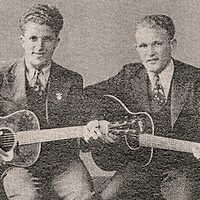
Callahan Brothers
Madison County has a well deserved reputation as a wellspring of musical talent, particularly as the home of accomplished singers of old ballads that trace back to the British Isles. The county has also produced artists who found success in the broader spectrum of country music. Among the earliest were the brother duet of Walter and Homer Callahan.
Walter Callahan was born in 1910, and Homer in 1912. They grew up in the communities of Faust and Laurel. Their father Bert, Laurel’s grocer and postmaster, was also an organist and voice teacher. Their mother Martha Jane sang and played the organ as well. Western North Carolina was full of great musicians, and the Callahans had opportunities to hear performances by Bascom Lamar Lunsford and the Carolina Tar Heels. On records and on the radio they heard music from across the country.
Walter was primarily a guitarist, while Homer played the banjo, fiddle, mandolin, guitar, ukulele, tenor banjo, harmonica, and bass. Singing together the brothers often yodeled, a talent that would become one of their signature sounds. They began playing publicly in the early 1920s, becoming well known area musicians. In 1934 they traveled to New York and made their first records, of which “She’s My Curly Headed Baby” became the most famous. In the same year they were hired to play regularly for WWNC in Asheville, for four dollars a week. Sometimes they performed with their sister Alma, and called themselves the Callahan Family.
In 1935, Homer and Walter moved to Louisville to play on the radio there, the first in a succession of cities they would call home during their radio and recording career. When they moved to Dallas around 1940, they began to perform as Bill and Joe Callahan, the names by which they are best remembered today. The Callahan Brothers remained active in the music industry for some decades, appearing in movies in the 1940s, and on TV shows in the ’50s. For one year in the ’50s, “Bill” (Homer) acted as manager for an up-and-coming Texas singer, Lefty Frizzell.
Eventually “Joe” (Walter) moved home to Asheville and became a grocer, as their father had been. He sometimes returned to Texas to perform with his brother. “Bill” remained in Texas for the rest of his life.


